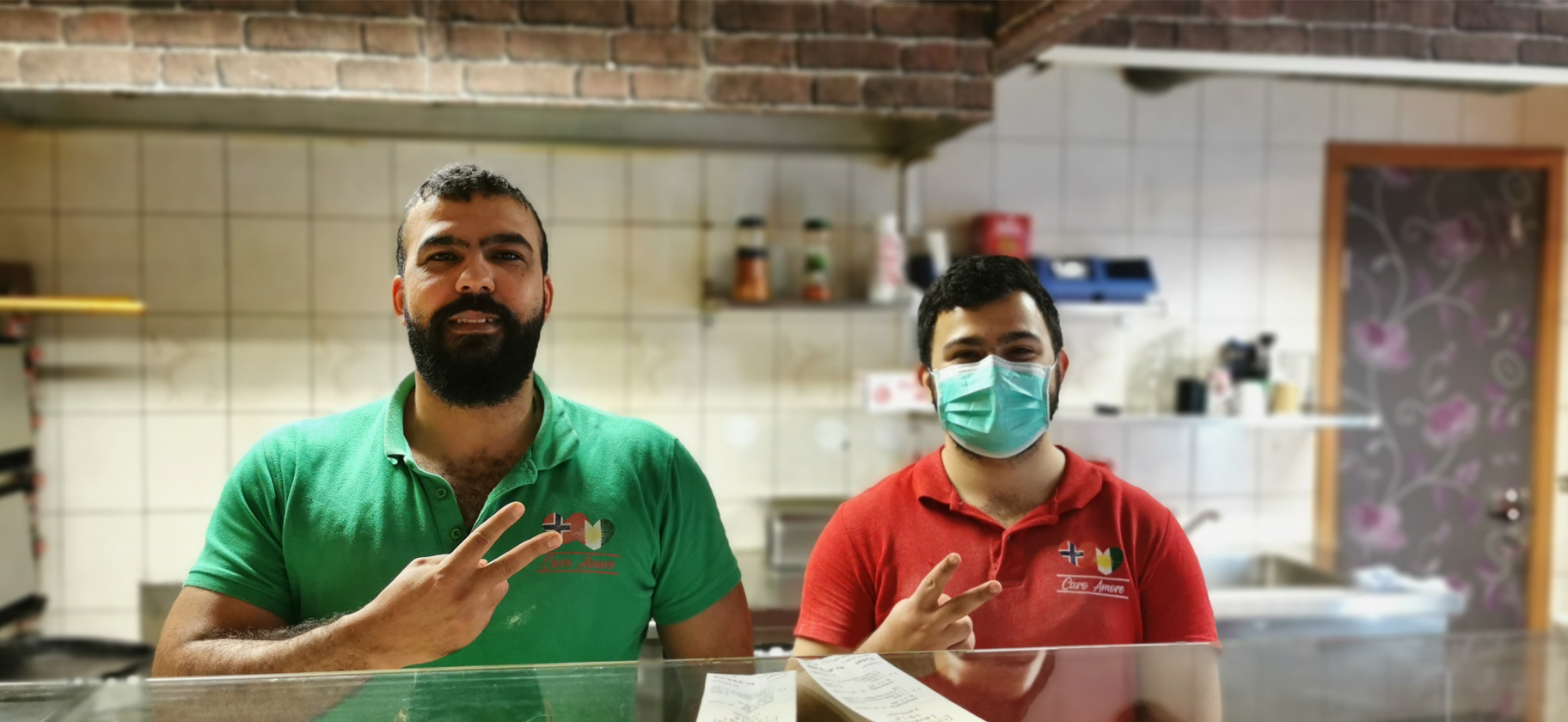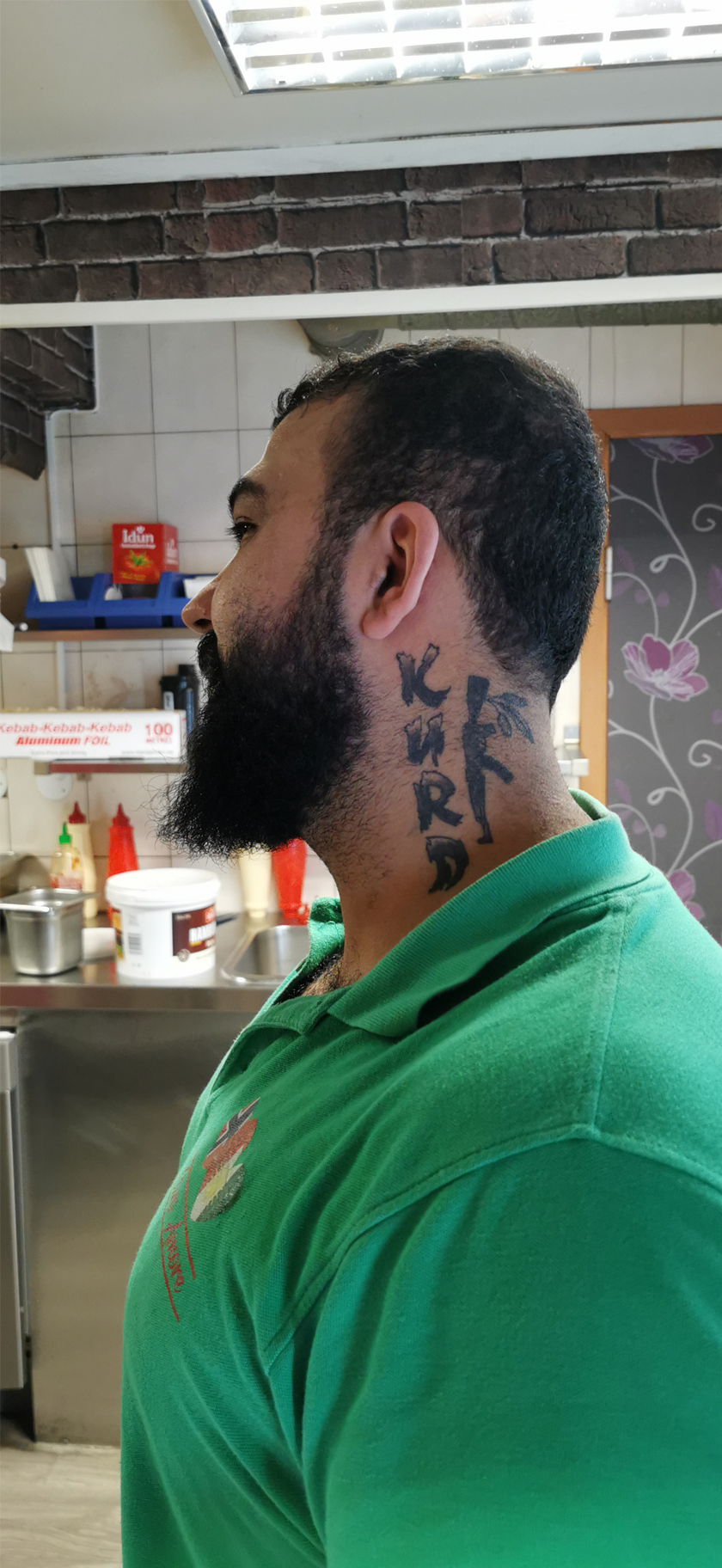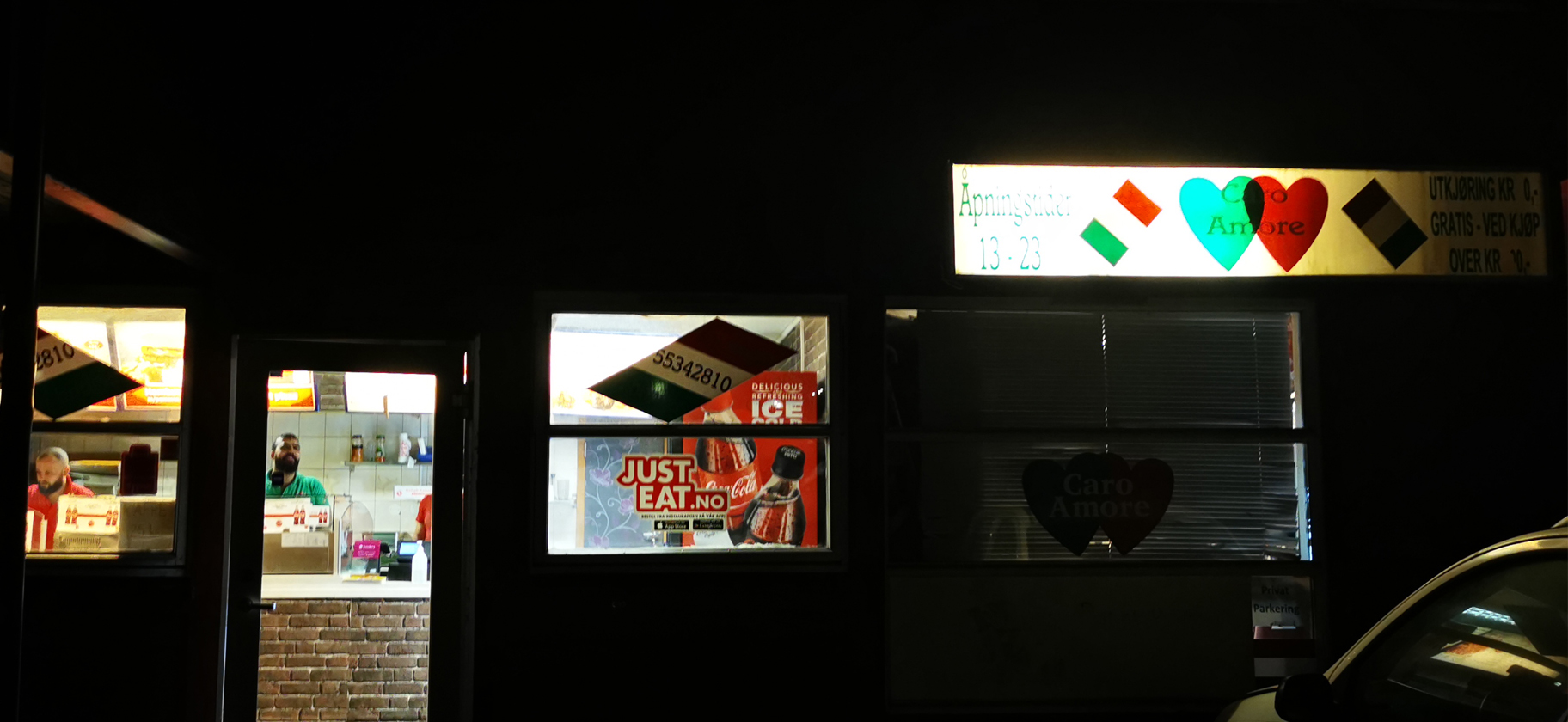Caro Amore

This is a story about how I got a free pizza.
Things are closed on Sundays in Norway. So, when I rolled into the Bergen-suburb of Fyllingsdalen after a long day’s drive, though I had a kitchen to work with where I was staying, I had no food and the doors to the REMA 1000 down the road were shut until the following day. I had consumed nothing but a cup of coffee, so whatever I could get my hands on was going to be my only meal. Bergen had also been hit hard (by Norwegian standards) by the coronavirus and so a lot of local businesses had shut themselves down hoping to ride out the wave for a while.
I set out on foot down the main road that heads into Bergen city and, on the far side of a sporting complex, came across a small pizza-shwarma shop called Caro Amore. After being on the road for seven hours I wasn’t about to get picky and they were open, so pizza it was going to be. Their machine rejected all of my cards and I hadn’t carried any cash on me for weeks. “No problem,” said the man at the counter. “You can just order online from the website.” I opened up my phone, found the website, plugged in all of my information, but to put the order through I needed to confirm using an incoming text message. My SIM card was only for data, so it was a text message that would never come, and there was no email option. I asked if they would accept some of the Canadian dollars I was still carrying. “What are we going to do with Canadian dollars?” they asked. I offered American dollars but got the same answer. “You know we don’t get many tourists so that’s why the machine only accepts local cards,” he told me. I asked if there was a cash machine nearby, but the nearest was in the city a solid three kilometres away and I told him that if I had to go all that way that I was just going to go to another place that was open. This dance of devising strategies of how to pay for the pizza went on for a solid quarter of an hour before I finally just figured it was about time to give up.
“You know what?” The man at the counter said. “Don’t worry, I’m gonna make you a pizza.”
“I have money,” I said. “I want to give you money. I just don’t know how.”
“It’s okay, it’s okay,” he insisted. “Now you get to learn about Kurdish hospitality.”
I hadn’t even noticed the emblem on the shop sign or on their t-shirts. In fact, at first I had confused the flag as Italian since the colours ran vertically and failed to notice the golden sun that had been placed in the middle. Until then, I hadn’t even noticed the tattoo running along the side of the man’s neck. What was a Kurdish pizza shop doing in the middle of a suburb of Bergen?
There has been an American-led conflict in the Middle East for most of my life. The last brick of the Berlin wall had barely been chiselled out before troops were heading into the region to free Kuwait in operation Desert Storm. I was still in elementary school and didn’t have a clue about what was really going on, but, after decades of cold war, when a conflict turned hot, it was news that would trickle down even to my generation. The operation didn’t last long, but ten years later I was sitting in a university lecture when a student interrupted the proceedings to tell us all that major news was breaking from New York City. Two years later, I was living and working in Korea when the US declared war on Iraq and there have been American troops in the region ever since. The bombing of the pentagon and twin towers in New York City sparked the war in Afghanistan which has been going on for almost two decades and is the longest war in American History. But the events of September 11th, 2001 were also the pretext for US involvement in Iraq and the removal from power of Iraq’s ruling regime led by Saddam Hussein. Although the second war in Iraq is said to have ended with a US-led coalition victory by the end of 2011, the vacuum of power it created led to the rise of the militant group of Islamic extremists known as the Islamic State of Iraq and the Levant (ISIL) whose presence in the region has caused widespread instability and sparked further conflicts, most notably the ongoing civil war in Syria. Although there has long been a pervasive sense of instability in the Middle East, American involvement in the area has made the troubles there seem not too distant and kept the eyes of the world focused on the actions of the nations with interests at stake, and American soldiers now being deployed there were not even born when the war began.
 Throughout these conflicts, one of the US’s most reliable allies has been the people of the unrecognized nation-state of Kurdistan. The Kurds represent a minority population in parts of southeastern Turkey, northern Syria and Iraq, and parts of Western Iran. Spread out through the region and split by these borders, the Kurdish people continue to seek independence and self-governance. A year ago, while travelling through Cyprus – a country that has had its own issues with neighbouring Turkey – I watched the news that, to the horror of many scholars and experts in the region, the US withdrew its forces from the area of northern Syria. Until then, there was a mutual understanding and sense of cooperation that the Kurds were aiding the US’s efforts to curb the presence and influence of the Islamic State and, in return, the US would protect the autonomy of the Kurdish people in the region. By leaving, the Kurds were left exposed to the Turkish army who immediately moved in, broke through Kurdish resistance, and wrestled away control of the region. Petros, the man who ran the guesthouse in Nicosia where I was staying, watched the news and, when I asked him if Turkish action in the region of northern Syria concerned him as a Cypriot, he admitted that what was happening there could happen in Cyprus too – it had happened before.
Throughout these conflicts, one of the US’s most reliable allies has been the people of the unrecognized nation-state of Kurdistan. The Kurds represent a minority population in parts of southeastern Turkey, northern Syria and Iraq, and parts of Western Iran. Spread out through the region and split by these borders, the Kurdish people continue to seek independence and self-governance. A year ago, while travelling through Cyprus – a country that has had its own issues with neighbouring Turkey – I watched the news that, to the horror of many scholars and experts in the region, the US withdrew its forces from the area of northern Syria. Until then, there was a mutual understanding and sense of cooperation that the Kurds were aiding the US’s efforts to curb the presence and influence of the Islamic State and, in return, the US would protect the autonomy of the Kurdish people in the region. By leaving, the Kurds were left exposed to the Turkish army who immediately moved in, broke through Kurdish resistance, and wrestled away control of the region. Petros, the man who ran the guesthouse in Nicosia where I was staying, watched the news and, when I asked him if Turkish action in the region of northern Syria concerned him as a Cypriot, he admitted that what was happening there could happen in Cyprus too – it had happened before.
The Syrian Civil War has been in the news for a decade with no real end in sight. It has been a flashpoint for operations by the Islamic State and is, at its heart, a proxy war and continuation of the old Cold War between the US and Russia who have been using it to exert their influence in the region. There have been an estimated half-million casualties directly resulting from the conflict, 8 million displaced people, and more than 5 million refugees – many of them Kurds. Rudi and Stipan who ran Caro Amore were part of this diaspora.
With bulging muscles and covered in intimidating tattoos, Rudi, the shop owner, looked like he could break me in half were he so inclined – were a cartoonist, in bad taste, to sketch the profile of the dreaded Middle Eastern terrorist, Rudi could have been the model. But Rudi was far from being any sort of radicalized extremist and admitted to me that the goal since immigrating to Norway has always been just to work hard and make an honest living. And as much as I was curious about how and why they had gotten themselves to this tiny corner of Norway, so too were they curious about how a Canadian had wandered over to their shop in the middle of a global pandemic.
That pizza was the only meal that I ate that day but it filled me more than so many previous pizza meals because there was not one iota of indifference in how it was served to me. Had I simply been able to tap my card and pay for it I may have learned nothing that day and thoughtlessly consumed a pizza while watching television. Instead, the universe was paid with kindness which I would later pay forward as well. I learned a lesson about Kurdish hospitality and that those who are displaced against their wishes are prepared to come to the aid of those who are displaced according to theirs.
